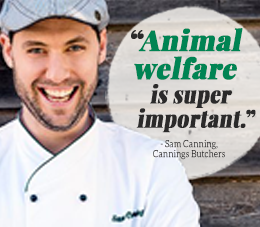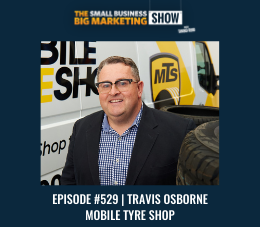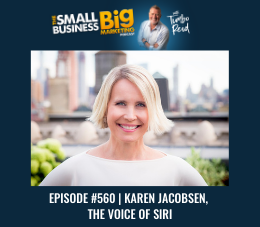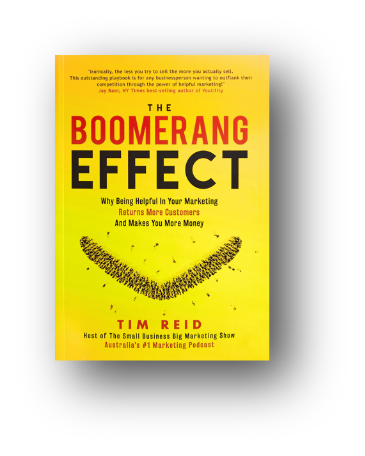Sam Canning used to be a vegetarian. Now he’s one of Australia’s leading ethical butchers, running six very fancy butchers shops in Melbourne’s most affluent suburbs. His experience in ‘paddock-to-plate’ butcher-shops in the UK inspired him to open his first shop here in Australia – with a focus on animal welfare. In 2010, the first Cannings Butcher Shop was opened in the leafy Melbourne suburb of Hawthorn. Now Sam has 6 shops (and let me tell ya, they’re not your average butcher’s shop) and he’s in the process of opening up two more. This rapid growth hasn’t come without some pain which Sam openly talks about, plus he shares how he’s gone about cleverly disrupting a very stayed industry.
There’s loads more tips and insights just like this that will help you build that beautiful business of yours into the empire it deserves to be. Hit the PLAY button above to listen now, or subscribe free to hear the full interview. You’ll also find the full interview transcription below.
Sam also shares:
- Why he became a carnivore
- The best marketing they do to attract and retain more clients
- His real estate strategy
- Why he’s chosen one word to cover all aspects of the Cannings business
- How he’s managed the rapid growth since opening on 2010
- The hardest part of running six butcher’s shops
- And much, much more.
Here’s what caught my attention from my chat with Sam Canning:
- I love that Sam’s challenging a very old and stayed industry
- Cannings use of SMS marketing is clever
- The fact that they’re documenting all systems and processes is also a smart thing to do before the business gets too big
Sam Cannings Interview Transcription
Tim
I started by asking Sam why he gave up being a big joke?
Sam
Look, I think that was just inevitable working in the meat industry. But look, I don’t know. I think probably I don’t know, maybe I just forgot about where may come from for a little bit. And, you know, just let the just let it. Maybe I wanted to forget it.
Tim
How old are you when you became a carnivore?
Sam
Well, look, to be honest, I still don’t have a lot of meat.
Tim
Don’t tell anyone that.
Sam
No, no, look, I think everybody is a little bit different. And look, I think I thrive without meat, but there’s something I couldn’t give up, and I couldn’t give up bacon.
Tim
Just hello, hello, bacon.
Sam
But you know, I can’t remember the last time I ate steak. Honestly, it’s been that long.
Tim
Is that weird? So it sounds weird coming from a high end butcher, who makes a living from selling meat. Correct me if I’m wrong.
Sam
I don’t know. You just got to listen to your body. I guess it’s not something that, you know, I don’t really crave it. I mean, once again, i crave bacon, and I love beef burgers. But aside from that, kind of a bit, whatever.
Tim
Let’s have a quick romantic bacon discussion, Sam. What’s your favourite bacon?
Sam
Look, our bacon is absolutely awesome. We make it ourselves. Quite smoky. But I’m actually loving at the moment a dry cured bacon, which we buy from local producer profit or packed in pack. They do a dry-cured free range bacon its preservative free. And it is absolutely awesome. It’s like herbie and a little bit peppery, but it’s like, you know, it’s the belly bacon so streaky bacon I’m actually you know, we’re smashing that at home at the moment. My kids, a eating about eight packs of it a week you can kind of do it a little bit, sort of more guilt free because you know its preservative free and nitrate free and but yeah, once again, don’t get me wrong. Our bacon is absolutely killer and you know that’s the best seller.
Tim
It’s the problem with bacon. We can’t stop eating and we can’t stop talking about it. This is a business show Sam I want you to focus. Focus. Look me in the eye. Now where the idea for running your own butcher shop come from?
Sam
Well, firstly, my dad was a businessman himself, and he was in marketing, but he was sort of in business for most of a lot of his professional career. I think that kind of entrepreneurial spirit is kind of hard coded into you. So you know, I sort of just went through a lot of my sort of early years as being a butcher is being, you know, quite sort of unsatisfied with just the day to day and sort of the core, the basics off the job itself. I do love butchering but, you know it comes to a point where in any sort of industry, I guess that, you feel that you’ve paid your dues, you’ve been doing it for years. You feel like you’re quite confident you’re quite good at your craft, and it’s like, what’s next? What’s next? And so I kind of got to that point, and I was actually thinking that I didn’t like the industry, and I was looking for, I guess ways to get out of it and kind of was it a bit of, crossroads, I guess you could say, and I’m not sure which way to go. And I went on a big overseas holiday around the world by myself about six months. And it was during that time where, I had a bit of a guess epiphany, and
Tim
Where were you and what was it?
Sam
Just to go hard and try and make something of this thing career that I’ve invested in?
Tim
So part of that epiphany was it simply to tell you to get back to Australia and start a business? Or was cannings butcher shop part of that?
Sam
No, I think. Look, the epiphany was hey, you don’t hate the industry. You don’t hate the job you want to be in control of, I guess your own destiny and in control of everything I’m saying here makes it sound like I’m a control freak. But actually, I don’t think I am anyway, but
Tim
I’m guessing you are, and I’ll just make a mental note to come back to that describe for us cannings because most of us haven’t been there. I’ve introduced it as, high end. Is it a butchery, butcher shop? But it’s pretty classy. So what’s the canning experience for someone who hasn’t been?
Sam
The canning experience is a beautiful fit out a nice shop aesthetically super clean, super organised ideally, one of the goals for us is that it doesn’t smell like a butcher shop. It’s got a fresh kind of smell going anyway. Good cleaning process, lots of fresh air going through the place. Most of the shops are pretty new as well but fairly young staff, high energy, good music, positive culture. Then there’s the high welfare, grass fed produce that we have, like, our own sort of selection criteria, which is quite strict. So we’re actually putting in a lot of time and effort where we get all of our produce from
Tim
Just go back to the experience. They’re beautiful shops. Did you have someone come in and designed them, or did you off your own bat?
Sam
Well, the first one? No, because everything was done on a shoestring, eh? So we didn’t have an interior designer. And I was sort of just, I guess, designing the shops myself. But the second shop we did, I got an interior designer and we did the full styled concept. You know, we’ve developed that even further over the years, but I mean, it does kind of all have the similar concept.
Tim
Let’s break it down. What you’ve just described to us because that it is not a standard butcher shop. In our pre interview, I suggested that you have challenged your industry, which I love. Your response to me was I didn’t realise I was which I found a little bit of outstanding because everything you’ve done, you know, if you put it, if you put a standard fifty year old butcher shop next to cannings, they are vastly different beasts. Excuse the pun. So did you not did you not overtly sort of go through the conventions of butchery? And so we’re going to do the opposite, or is it just played out that way?
Sam
Yeah, I think it has played out that way a little bit. I mean, I guess that’s one of the benefits of having your own business is you get to just do things the way that you like before I opened the first store my dad helped me sort of developed, I guess the brand a little bit. And what sort of our key points are differences were.
Tim
How did you do that, Sam? How did your dad help you develop the brand with this certain questions that he asked or certain exercise he took you through?
Sam
Yeah, probably. But I can’t remember exactly what they were because it was about nine or so years ago now, and but look, my dad and I were workshopping quite a bit of stuff as well as a lot of the local kind of demographic data, because Hawthorne where the first shop was, there’s the logo in the name. What do we call it? And then there was the key points of difference. And I think at the time where it was all natural free range and hormone free grass fed hormone free that kind of thing. Yes, a lot of it was just around was quite simple, I guess, in terms of, it was all about the high welfare produce.
Tim
So fundamentally. The foundation of Cannings is high welfare produces. Were then everything else kind of came from that, and if so, what does that mean?
Sam
That’s a deep question the whole meat ethics thing, but put simply, beef that hasn’t been in a feed like beef. That’s been grass fed for its entire life’s beef and lamb that’s been grass fed for its entire life. It hasn’t gone into a feed like a credited free range, chicken accredited, free range pork, but just going a little bit further than that in like meeting farmers actually going out to that to our producers and seeing their establishments and stuff like that. And that’s still something that I do today. And it’s something that is sort of more regimented in our canning selection process.
Tim
So everything you sell at canning Sam, someone you or someone else has gone checked out how that animals are being treated. You
Sam
Me personally
Tim
That’s something you are virtually using. Your marketing.
Sam
It is. We’ve got a new website coming out next week, and that’s sort of a little bit more front and centre, that kind of philosophy. But, yeah, absolutely it is.
Tim
I am talking to Sam Canning fancy pants butcher, I call you. Say thanks to American express. Now again, going back to how you’ve challenged the category. So beautiful store food, well of meat and deserts. Funnily enough, well presented. You got a bit of blueberry crumble. I notice in there you got to wash down the beef somehow. What else you have done in terms, of butchers of always, i would argue, been pretty good. Customer service have been very welcoming. Sort of, you know, their fundamental part of any local community. How do you do that?
Sam
Look, it was easier when I was actually doing it personally when I had just the one store being Hawthorne. Yeah, I mean, that’s how I built the business. Spent a lot of time on the counter. I’ve never been good with names or I’ve never been as good with names as when I started up my own business. And I was just remembering everybody’s name and just have it building a really good relationship with everyone. And, yeah, it’s been harder now because i don’t spend any time on the counter at all because we do have six stores and spending time on the counter is quite hard.
Tim
Is that frustrating?
Sam
Look, it was initially, but to be honest with you, it’s it has been quite a while, and it’s sort of, my role has changed a lot over the over the years. And I don’t think about it as much as I used to. Used to really bother me not having the time, and it’s really the only reality.
Tim
Now I’ve heard it a lot, and they had a painter commercial painter on a couple of years ago. The minute he stepped off the tools, stopped painting buildings and worked on quotes, client liaison, follow up or that kind of stuff. His business quadrupled literally within a couple of months. And it’s a funny part of small business, isn’t it? Sam? Where you go into it? I mean for you. You loved butchery for the painter guy. His name is Tez, actually He loved painting. But there’s a point in business where we started because we love something. But now that love is growing, so we’ve got to step away from it and focus on more, almost administrative slash strategic kind of tasks.
Sam
That’s right, that’s right. Indeed. And look, no business can ever be really is good as it can be without, you know, like a retail business I’m talking about. But, I mean, you know, the front man on the front person of the business, just really driving. It can never be a strong as that moment. But yeah, look, all of my manager’s they’ve got an amazing sense of ownership. They really do treat the place like their own, and I couldn’t ask for much more out of my management team. They’re doing such a great job.
Tim
You’ve had a pretty decent growth. You’ve got six stores now in six of Melbourne’s leafiest suburbs you’re eight years old. Can you pinpoint the moment where you thought hang on. This is working
Sam
Well, look, to put it into perspective. It was 2010 when we opened Hawthorne. I was there with that one shop building that up until 2014, before I took the next opportunity. Then it’s pretty much has been one every year after that.
Tim
What’s been what’s been the hardest part Sam of bringing canning to market?
Sam
I’m probably not unique and saying that people and culture is a hard one. Yeah, it’s not like I’m pushing it up hill all the time. You know, i feel like we’re in a really great spot at the moment, but just that moment, you know, there is that moment when the owner kind of has to step out of the daily operations of the business. But you still need to try and uphold all the values. It’s like, it’s all these values that I’ve had
Tim
How do you do that?
Sam
I’ve got in me and I need to kind of instilling amongst the other across the whole group. How do you do it? Look, we have a lot of, I guess, just a lot of meetings, a lot of talking with staff, a lot of documenting now. I guess we’ve become a little bit more corporate in that regard. You do have to kind of document all these kinds of things and put it all on paper, because it does get hard, it does get harder and harder to communicate it. And where six stores in now and about one hundred staff and my values of sort of come to this point where they kind of are something that is kind of on paper and you kind of need to explain it to people because it is different. Like I’m not in the store with everyone and people can’t. There’s not that kind of grafting thing that goes on when the owner is in the one shop and everyone else can just observe the owner and see what values are.
Tim
So you’ve got you’re finding a way around six stores now and trying to do that on a fairly regular basis. I was talking to actually a past guest only last week. Felicity Rogers from cargo crew, which is an interesting business, is challenging that all the conventions of the corporate uniform industry she’s seen huge growth over the last couple of years. You know, gone from a handful of staff to thirty or forty staff, they have a meeting every morning, literally. First thing nine o’clock everyone in thirty or forty of them. Just a quick update. Anyone can talk. Someone facilitates that. They share the facilitation of it just a way of connecting bit harder for you because you got six stores. They’ve got one.
Sam
That’s amazing. I would love to do exactly that. We’ve got a head office now, and we actually do that within a head office. But you’ve got the retail thing in multi store kind of thing, it is harder.
Tim
It’s amazing that you’re talking that you have become very corporatized a six stores. Does that? Does that sit comfortably with you?
Sam
It does, actually. I must say, I just maybe I was born for corporate life or whatever, but it’s I mean, it’s not super corporate, but we do have the head office structure thing going on, and I’m quite office bound these days. But I love it. I love planning. I love strategy. I love organising things. Always have. And I still get to do all of that. Yeah, just not cutting meat.
Tim
Bit of a control freak Sam.
Sam
No, just like organising that’s all.
Tim
Of course. Let’s talk a bit more marketing. Let’s drill down on the marketing of the cannings because there’s some things you’re doing that I find it quite interesting. You have managed to get the whole canings brand down to one word, and I don’t hear this very often from business owners. I think it’s very clever. What’s your one word and break it down for us?
Sam
So the one word is care. Essentially, the philosophy around it is if we care about every little step of the process. All you have to do is give every little bit of process a bit of care. And everything is going to work out fine when I say every bit of the process, it’s, you know, it’s your workmanship. It’s how you treat your customers, how you treat your staff. If there’s care in every one of those little steps, then with a bit of care, nothing can really go wrong.
Tim
I like that where that idea come from. That’s something you’d read in a marketing textbook.
Sam
Well, yeah. Look, I’m going to sound like a bit of a copycat now, if I tell you, but no, I got it from well, from the rock pool. And I, think I read that on inflight magazine and Neil Perry was in an interview, and he had I think his mantra was also care or something very similar, and it just really resonated with me. I’m like, holy hell. That is perfect for us. And yeah, that’s what we go by.
Tim
And really, that is care for the customer. It’s care for the animal. It’s care for the farmer, the supplier, the staff it’s just every aspect of the cannings business.
Sam
That’s right.
Tim
That’s good, mate. Clever. Real estate strategy. Talk to me about that. You are in again. This is a global show. But you are in Melbourne’s most affluent suburbs. You were what? Again? What’s the thinking there? Sounds obvious, but why?
Sam
Look, it kind of is obvious. Obviously. What comes with the high welfare free range premium product is a price tag. It kind of reflects that kind of product. And yes, just so happens that we have to be in those suburbs to sort of be able to get that premium.
Tim
Now, don’t get cross with me, Sam. I’ll get my figure out how expensive you are now, by this simple, simple little formula. I get my fillet from Coles and its thirty nine ninety nine. A kilogramme. How we going so far?
Sam
Well, look on face value. We’re not going too well. But look, there’s different grades. I guess that would be on the supermarket shelf. Y can get good meat from the supermarket. They do have some salt select kind of lines, grass fed, and premium kind of stuff. But, it’s not really an apples for apple’s kind of situation. Come on. I think you’d find that comparing apples for apples. And like we trim or the silver skin off the top, I think you’ll find it’s pretty similar.
Tim
It’s interesting. I bought an I don’t know even what you call it, but a slab of meat from elder the other day. So this is just getting embarrassing but someone you’ve got to get it. But it was actually all you just call it silver skin. Sorry, you vegetarians listening. But it was very tough. Was very average.
Sam
Yeah, well, I think a lot of the time where the supermarkets let them down is just the ageing process. They really do rush things through. And with red meat in particular, it needs age needs minimum two weeks, ideally, about four weeks of ageing before it’s ready to eat. And, you know, supermarket does buy it one day and sell off the next, and it’s just not ready so it could just be something as simple as that.
Tim
What’s the best marketing you do for cannings Sam?
Sam
Oh, you know what? This is something we’ve been doing for years and i just think it is the best marketing avenue off all time. And that is, its sms. Its text message. We’ve got a fairly large database of sms of mobile numbers that we’ve acquired over the years where our customers have opted into the programme and we text them we clear or fortnightly just week’s specials. And it’s so good. I mean, everyone’s phone is within about a metre of them at all times, so we do quite a lot of different things. But you know, the text message is just that one thing. It’s just straight to the customer, and I just don’t think there’s anything better that and better than that. And it’s, it’s pretty cheap as well.
Tim
I think that’s genius. How you capturing their mobiles?
Sam
How we doing it at the moment? Look, we have the face to face thing over the counter. So just a lot of communication. We’ll put a little card in their bag or something like that, and then they do it when they get home. But, I reckon that’s one of the best things. One of those things ever.
Tim
Well, it’s an idea. I mean, you can imagine how many times you ask that question. Sms marketing. It does not come up off, and i and i think it’s very clever because, as you say, your phone is always with your person. Generally speaking throughout the day and night, I don’t know about you, but I don’t get a lot of marketing come through my phone.
Sam
It’s a bit of a hard sell. People don’t want to give up their mobile numbers. I think you really need to have a friendship, something with the customers.
Tim
School of butchery. What is it and why is it?
Sam
School of butchery, it’s a series of one night courses that we run out of our cue store. Basically, there’s different courses. There’s a lamb night. There’s a sausage night. There’s a night that we call the cannings apprentice, which is we do a lot of little things. Basically, people can buy tickets from the weteachme website and, it’s an events that we hold at the cue store.
Tim
Yeah why?
Sam
Why is it? Not sure. Bit of fun. Just let people see what we do behind the scenes. There’s a bit of mystery.
Tim
Is it good for business? Is it way for you to give back? Do you get staff out of it? Is there any strategic reason for doing these? What are they called again? School of butchery nuts?
Sam
Yeah, look without sounding bitter and jaded about it. I don’t there’s any good that comes out of it. It’s honestly it’s not a money spinner. It’s so hard to run these nights at a really good price point. It’s tied for us to make money, even when they’re incredibly expect, like their lower. Quite expensive. I think you know, they sort of average around three hundred to four hundred dollars a night per person, but they’re just great fun.
Tim
How many do you get along to one of those nights?
Sam
I think we cap it at about eight. Some of them are capped at six depending on.
Tim
That’s about two and a half grand to say two grand a night. How you’re not making not huge dollars, but why don’t you make enough money, how can they cost you money?
Sam
Look, I think a lot of it is just down to the cost of the materials that we have to work with being meat. It’s expensive. We can’t use what we work on essentially we cook a bit of food. We serve a little bit of wine we hand out, the knives. We give the customers, the guests, we give them the knives and things like that, so I don’t know. It just adds up the staff, except we got to pay our staff to be there.
Tim
You sound pretty bitter and twisted about it Sam
Sam
No they’re selling out. Actually, the limitation for us is actually finding that our staff who are prepared to do because it’s a Saturday we host them on Saturday nights, and we actually run out of staff who are able to host them
Tim
I may be a bit behind the times, Sam. It wouldn’t be the first time i have been called that a bit slow. But looks like butchery is following the same trajectory as being a barber. Barbers have become very cool again. You know, we’re seeing them pop up on every street corner and in between there are offering an incredible experience. I had a fellow from a barber’s on the show only recently. Barbers called scumbags. Fantastic experience. That’s where i get my hair cut. But again, what I’m seeing in the land of butchery is we’ve got the traditional butcher shop. We’ve got these I’ve got a sort of I’ve got a half fancy butchers shop near me, but it doesn’t go past sort of just the presentation is like a little bit better than the standard butcher shop. And then you’ve got butcher shops like cannings. You’re sort of seeing an industry that’s really starting to change right in front of your eyes.
Sam
Yeah, absolutely. I’m seeing the next generation kind of come through. And, there’s some really great ideas and concepts and stuff coming through. And unfortunately, it was kind of forced upon the meat industry by the supermarkets who, taking control of the ministry quite a lot and running a lot of the smaller operators out of town in a lot of places. But look, we always open up next to a supermarket. It’s that’s part of our business model to be near a supermarket and just take them. We not really take them on, but, I mean, we’re just not really worried about. You’ve got to have them there for the foot traffic. You know, people are thinking food when they’re at the supermarket
Tim
You’re selling. You got six retail outlets. You’ve got an online store, is there? What do you see the future of butchery being? Is it online?
Sam
Look, I think on line’s got potential to have a lot of growth. We’re investing quite a bit in the online space at the moment. We’ve been doing online for about four years, and it’s pretty good, but it’s nothing like its nothing like retail like, you know, bricks and mortar kind of retail for us.
Tim
But so can you imagine canings having twenty stores around Australia in the next ten years? Or can you imagine that reducing and having a much stronger e commerce presence
Sam
Depends which day it is. Because, yeah, not lately, though. I haven’t had any thoughts about, sort of downscaling and just going into the online space, although I have thought about it a little. How fancy free and how easy would that be? Just having online store, not how many retail stores, but now I haven’t had. Haven’t been thinking that way for a while now. And having said that, no, I look, I’m not sure about the interstate expansion twenty, thirty, forty stores across Australia. I want a simple life that I can manage. And, yeah, I don’t need that crazy kind of scale in my life, I don’t think, but don’t quote me.
Tim
Oh, what what’s your work life balance like Sam, I’m reckoning. It’s pretty good.
Sam
It’s really, really good. Yeah, I worked four days a week, about three or four months ago. I made the decision and I gave myself permission. To not work on Friday’s as well as Saturdays and Sundays, and that’s been probably one of the best things I’ve ever done. And, I basically get Friday spend on myself because obviously, Saturdays, Sundays quite sort of family orientated. I’ve got two little kids.
Tim
So what’s Friday look like?
Sam
Friday is spending time in my recording studio or taking my motor bike out for a spin
Tim
What are you recording? Podcast?
Sam
Well, yeah at the moment, but look, I love recording band’s recording rock bands. Basically.
Tim
That’s brilliant, buddy. So you’re taking that Friday off. that decision, because again, a lot of business owners listen to this going. How could I ever do that? Not in a million years. Did you take a hit financially to do that?
Sam
No. Look, I think the head office structure as that sort of development developed. Look, we’ve got about eight people in the head office at the moment, and I’m just at that point where it kind of doesn’t really matter where I am at any one particular point in time. Now as long as I can answer a phone call, respond to an email, keep the wheel spinning because I’m not really a part of any sort of day to day kind of stuff anyway, so its decision making and conversations and strategy is what I do. And they don’t need that on a Friday.
Tim
Good and a good decision. Obviously you’re better off for it. Your wife’s probably loving it. Kids are loving it. Like the old man. You know, that he has Fridays off
Sam
But no. Look, I completely understand, the trap that sort of, we all fall into. And look, if you’re working in a retail kind of thing and your part of the manpower than you don’t have a choice, and I totally get it because I’ve done that. But yeah, i think as we went into that sort of head office structure. It’s just I’m not really missed. So
Tim
I think it’s a great storey, mate. I wish I could get down to a cannings butchers in my old hometown, but alas, you’ll have to open one in Noosa, if that’s going to happen. Not out of the question being Melbourne’s most northern suburbs. So who knows?
[Podcast] Ethical butcher Sam Canning of @canningsbutcher used to be a vegetarian … now he’s the owner of 6 fancy butcher’s shops in Melbourne’s most affluent suburbs https://t.co/zQL0sksAvM
— Timbo ? (@TimboReid) November 5, 2018
Resources mentioned:
- Cannings Butchers official website
- The winner of this week’s Monster Prize Draw is Danielle Rathman from Heartbeat Handicrafts
Jingle of the Week – Big M
Please support American Express who make this show possible:
American Express Business Explorer Credit Card
Let your business expenses reward you. Every year.
And join me at the Idea Exchange in Sydney on November 22, 2018.
If something in this episode of Australia’s favourite marketing podcast peaked your interest, then let me know by leaving a comment below.
May your marketing be the best marketing.





















